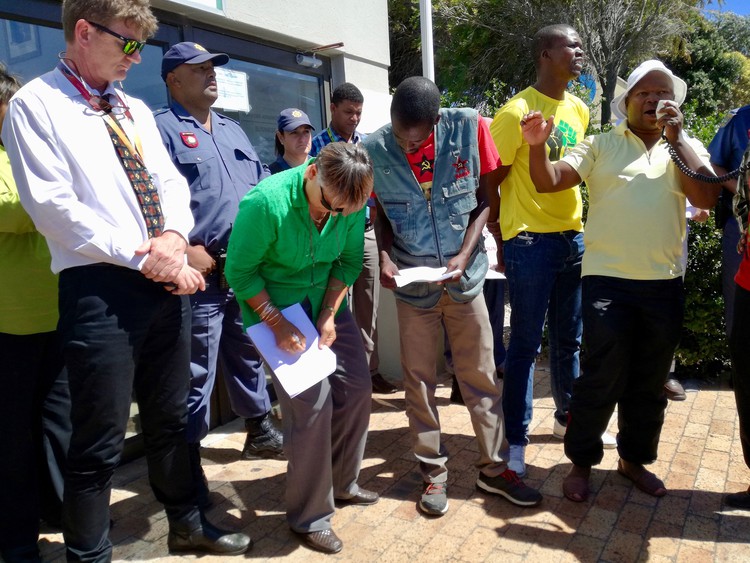
Ward councillor Felicity Purchase signs a memorandum from Masiphumelele residents, and community leader Lunga Mathambo (right) addresses the protest marchers with a megaphone. Photo: Thembela Ntongana
14 February 2017
About 100 residents and neighbours of Masiphumelele marched to Fish Hoek Civic Centre today, where a sub-council meeting was being held, to hand over a memorandum on unhealthy living conditions.
The march was supported by members of the Social Justice Coalition (SJC) and Right2Know.
Community leader Lunga Mathambo said, “The dignity of a black child that is in Masiphumelele continues to go down the drain.”
The memorandum read: “We as the people of Masiphumelele led by the Squatter Forum hereby acknowledge that the City of Cape Town is using party politics to delay and deprive the community of basic services. The City continues to demolish people’s houses without providing alternative land for those affected.”
Residents want electricity for the people affected by the devastating fire in November 2015 in Masiphumelele’s informal settlement. They also want the City to provide alternative temporary land for people living in the wetlands within ward 69, while they are still waiting for houses.
They also want the person appointed by the City as community liaison for what is known as the Phase 4 development to step down, as this was done without consultation with the community. Phase 4 will see the construction of 156 new houses. The beneficiaries will mainly be backyarders and residents from informal settlements in Masiphumelele.
Resident Busisiwe Mlamla said many have been living without electricity. “They keep telling us they are not providing for the people that are not within the [municipal defined electrification area] boundary … I and many others are inside the boundary and have been beneficiaries of electricity before. What has changed now [after the fire]?”
The City said the boundaries for electrification are determined by wet areas where electrification is undesirable.
Mlamla said she has given up on the prospect of getting a house. “I have been applying since 2000. I am over 40 years, and still my name does not appear on the list of beneficiaries for Phase 4.”
Earlier this year, the City of Cape Town was given a directive by the Provincial Department of Environmental Affairs and Development Planning to clean up the wetlands informal settlement in Masiphumelele.
Nkosi Maswazi, who has been living in the wetlands informal settlement for ten years, said, “People throw away their faeces there [in the canals] because they do not have enough toilets. They have no other option; you cannot expect 500 people to share one toilet; that is inhuman.”
He said the City needs to come up with a feasible plan for the wetlands area.
Ward councillor Felicity Purchase accepted the memorandum. “We will look at the memorandum and respond within the 14 days,” she said.